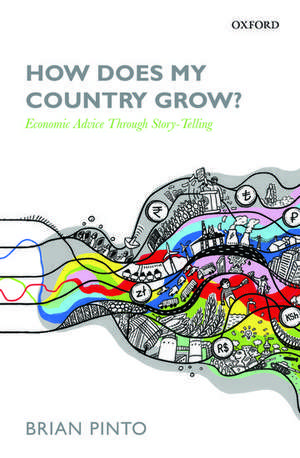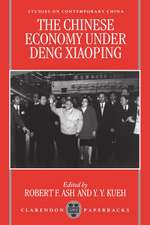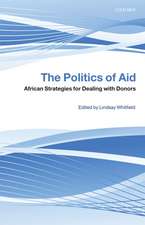How Does My Country Grow?: Economic Advice Through Story-Telling
Autor Brian Pintoen Limba Engleză Hardback – 18 sep 2014
Preț: 353.47 lei
Preț vechi: 432.98 lei
-18% Nou
Puncte Express: 530
Preț estimativ în valută:
67.64€ • 70.80$ • 56.29£
67.64€ • 70.80$ • 56.29£
Carte tipărită la comandă
Livrare economică 19-25 martie
Preluare comenzi: 021 569.72.76
Specificații
ISBN-13: 9780198714675
ISBN-10: 019871467X
Pagini: 270
Ilustrații: 10 Figures, 14 Tables, 27 Boxes
Dimensiuni: 162 x 235 x 22 mm
Greutate: 0.54 kg
Editura: OUP OXFORD
Colecția OUP Oxford
Locul publicării:Oxford, United Kingdom
ISBN-10: 019871467X
Pagini: 270
Ilustrații: 10 Figures, 14 Tables, 27 Boxes
Dimensiuni: 162 x 235 x 22 mm
Greutate: 0.54 kg
Editura: OUP OXFORD
Colecția OUP Oxford
Locul publicării:Oxford, United Kingdom
Recenzii
In spite of its playful title and easy-on-readers subtitle, economist Pintos brief book is a sophisticated, engaging odyssey on economic growth and development. Laden with equations, figures, tables, boxes, annexes (appendixes), notes, and 20 pages of references and index, the book is an authoritative complement to more abstract, theoretical treatments of economic growth.
Reading Brian Pintos book,How Does My Country Grow? Economic Advice through Storytelling, is refreshing.
Brian Pinto's fascinating book starts in Poland at the outset of its transition, and then continues to Russia before its 1998 financial crisis, before bringing us to India ten years after its sweeping reforms were implemented, and finally to Kenya during its improving economic performance prior to the 2007 elections. Through these countries' stories, the book revisits the recent history of developing and emerging market economies and points to the essential elements of a pragmatic growth policy package for developing countries. I strongly recommend this insightful book to researchers and policy makers interested in growth and development.
This is a special and rare book, which builds on Brian Pinto's deep experience. It shows how one uses theory, country knowledge, and practice, to analyze the world and make policy recommendations. It is a pleasure to read; the style is relaxed and clear, and the boxes are good.
Brian Pinto brings a unique combination of passion, personality, knowledge of the latest economics research, and good common sense to his vibrant discussion of the interaction between sovereign debt and economic growth. He draws on personal experience from his work at the World Bank on Kenya, Poland, India and Russia to formulate broader policy lessons about critical issues that arise repeatedly in emerging market countries. The exposition is refreshing and insightful, and it makes the practical implications of economic research come to life.
Brian Pinto is that rare economist who is abreast of theoretical research on economic growth and has also participated in policy design and implementation during crucial periods in several countries. This account of his experiences from his long career with the World Bank will be of interest to everyone who thinks about economic growth.
Brian Pinto brings country economic policy to life and shows what it means to practise it. The stories in his insightful book resonate very strongly with me as a practitioner on the ground. His analysis of the linkages between growth and sovereign debt is spot-on. Brian was one of the best economists I worked with at the World Bank--and this book is a fun read too!
Pinto argues that 'country economics' is in effect a separate branch of economics. Economic theory and the 'conventional wisdom' offer only starting points. He succeeds admirably in offering insights about what drives the growth experiences of developing countries, and points out the perils of conclusions drawn hastily from afar. Understanding the linkages between a country's sovereign debt dynamics and its microfoundations of growth is the core of his investigation.
this is an engaging, well-written volume not to be missed.
anybody with more than a passing interest in development will find it absorbing and learn a lot.
important contribution to the understanding of economic development
Reading Brian Pintos book,How Does My Country Grow? Economic Advice through Storytelling, is refreshing.
Brian Pinto's fascinating book starts in Poland at the outset of its transition, and then continues to Russia before its 1998 financial crisis, before bringing us to India ten years after its sweeping reforms were implemented, and finally to Kenya during its improving economic performance prior to the 2007 elections. Through these countries' stories, the book revisits the recent history of developing and emerging market economies and points to the essential elements of a pragmatic growth policy package for developing countries. I strongly recommend this insightful book to researchers and policy makers interested in growth and development.
This is a special and rare book, which builds on Brian Pinto's deep experience. It shows how one uses theory, country knowledge, and practice, to analyze the world and make policy recommendations. It is a pleasure to read; the style is relaxed and clear, and the boxes are good.
Brian Pinto brings a unique combination of passion, personality, knowledge of the latest economics research, and good common sense to his vibrant discussion of the interaction between sovereign debt and economic growth. He draws on personal experience from his work at the World Bank on Kenya, Poland, India and Russia to formulate broader policy lessons about critical issues that arise repeatedly in emerging market countries. The exposition is refreshing and insightful, and it makes the practical implications of economic research come to life.
Brian Pinto is that rare economist who is abreast of theoretical research on economic growth and has also participated in policy design and implementation during crucial periods in several countries. This account of his experiences from his long career with the World Bank will be of interest to everyone who thinks about economic growth.
Brian Pinto brings country economic policy to life and shows what it means to practise it. The stories in his insightful book resonate very strongly with me as a practitioner on the ground. His analysis of the linkages between growth and sovereign debt is spot-on. Brian was one of the best economists I worked with at the World Bank--and this book is a fun read too!
Pinto argues that 'country economics' is in effect a separate branch of economics. Economic theory and the 'conventional wisdom' offer only starting points. He succeeds admirably in offering insights about what drives the growth experiences of developing countries, and points out the perils of conclusions drawn hastily from afar. Understanding the linkages between a country's sovereign debt dynamics and its microfoundations of growth is the core of his investigation.
this is an engaging, well-written volume not to be missed.
anybody with more than a passing interest in development will find it absorbing and learn a lot.
important contribution to the understanding of economic development
Notă biografică
Brian Pinto is Chief Economist, Emerging Markets, at GLG Partners LP. Previously, he worked at the World Bank for almost 30 years, where his focus was predominantly on transition economics, sovereign debt, and economic growth. He lived in Poland at the start of its momentous reforms (1990-92) as well as in Russia, witnessing first-hand its 1998 crisis and subsequent recovery (1998-2001). His publications, inspired by live country experiences, have appeared in the Brookings Papers on Economic Activity, the Economic Journal, Journal of International Economics, The Review of Economic Studies, and other professional journals. A book he edited jointly with Joshua Aizenman, Managing Economic Volatility and Crises: A Practitioner's Guide, was published by Cambridge University Press in 2005. Brian holds a PhD in Economics from the University of Pennsylvania and degrees from the Indian Institute of Management, Ahmedabad, and Loyola College, Madras University, India.










